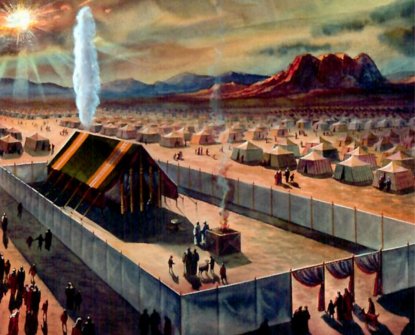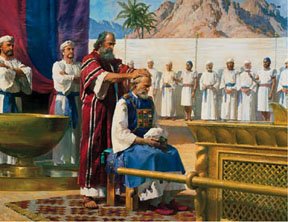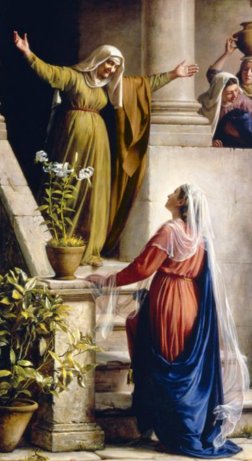Exodus 6:23
Leviticus 10:14
Numbers 18:11, 19
Background: Abt. 1490 BC
During their first year of wandering the children of Israel were commanded to build a tabernacle for the Lord. Aaron, the prophet Moses’ spokesman and brother, and his four sons were washed, anointed, clothed, and consecrated to be priests in the tabernacle (Leviticus 8). From that time forth Aaron’s posterity, also known as the Levites, were set apart from the other tribes of Israel and were the only ones to hold the priesthood authority. The Levites did not receive a land of inheritance like the other tribes did because the received the priesthood as their inheritance (Numbers 18:20).
Facts about her:
- The name “Elizabeth” is derived from her name. Elisheba is a Hebrew name meaning “God’s oath” or “God is her oath.” source
- She was from the tribe of Judah and was the daughter of Amminadab and the sister of Naashon (Exodus 6:23);
- She married Aaron, the brother of Moses and Miriam (Exodus 6:23);
- By marrying Aaron she united the tribe of Judah with the tribe of Levi, becoming not only a direct ancestress of Jesus Christ but also of John the Baptist;
- She was the mother of four sons, Nadab, Abihu, Eleazar, and Ithamar (Exodus 6:23) and several daughters whose names we don’t know (Leviticus 10:14; Numbers 18:11, 19);
- Her husband and sons were washed, anointed, and dressed to become priests and serve God in the tabernacle (Leviticus 8). Moses also consecrated them by taking the blood of the offering and “put of the blood upon the tip of their right ear, and upon the thumbs of their right hands, and upon the great toes of their right feet… and sprinkled the blood upon the altar round about”(Leviticus 8:24);
- Two of her sons, Nadab and Abihu offered “strange fire” to the Lord when they weren’t commanded to. Because they misused their priesthood authority the Lord devoured them by fire (Leviticus 10: 1-2);
- Her other two sons, Eleazar and Ithamar, were faithful their whole lives and were priests among the children of Israel. Shortly before Aaron died Moses passed the garments of the High Priesthood on to Eleazar, who acted as High Priest in the tabernacle until after the children of Israel crossed over the river Jordan (Numbers 20: 25-29);
- She and her daughters partook of the holy offerings, the wave breast and the heave shoulder, just like her priestly husband and sons did (Leviticus 10:14; Numbers 18:11, 19);
- She was the “mother” of the entire Levitical Priesthood;
Speculations about her:
- Her name, meaning “God’s oath” may have reference to the covenant that God made with Abraham. source
My Thoughts
Thought #1
Even though she and her daughters were not ordained or washed and anointed like the men in their family, they still partook of the same holy offerings as the men and had part in the covenant God made with the Levites. We read that the Lord said:
“And this is thine; the heave offering of their gift, with all the wave offerings of the children of Israel: I have given them unto thee, and to thy sons and to thy daughters with thee, by a statute for ever: every one that is clean in thy house shall eat of it… it is a covenant of salt for ever before the Lord unto thee and to thy seed with thee…” (Numbers 18: 11,19)
Even though the men may have had more responsibility for the tabernacle, through their role of priests, the blessings, nourishment, and covenants made in the tabernacle were for all those who were clean, both men and women, to partake of. Just as this eternal truth was true in Elisheba’s day so it is true today. Even though women don’t have the same priesthood responsibilities as men they still are entitled to partake of all the blessings associated with the priesthood and priesthood covenants. God has an inheritance for His daughters just like he does His sons.
Thought #2
As I was researching I read a quote in “All the Women of the Bible” by Herbert Lockyre about how the Old Testament Elisheba and her sister-in-law Miriam are types and shadows of the New Testament Elizabeth and Mary.
” It is not only in the New Testament that Elisabeth and the Holy Mary are those associated together: their types in the Old Testament are in like manner combined… Elizabeth herself, it is said by Luke, was of the daughter of Aaron but it is mentioned in the book of Exodus that Aaron’s own wife was name Elisheba, that is Elizabeth (6:23); again we find in Luke, that the Virgin Mary was the cousin of Elizabeth, so in the former instance the sister of Aaron was named Miriam, that is Mary, for it is the same name; Miriam or Mary, the virgin prophetess, who took the lead of all the other women in singing the song of thanksgiving for the miraculous deliverance of Israel (15:20). Thus even now the Blessed Mary is followed by all other women in her signing her Magnificat; the virgin and the prophetess, she leads the sacred company in the Church unto this day” (From Issac Williams, “Female Characters of the Scriptures”)
I still can’t really wrap my mind around this whole concept but the story of Elisheba gives a whole new depth and meaning to the story of Elizabeth and Mary that I am going to have to ponder on. The Old Testament Elieshiba was from the tribe of Judah and therefore would have been part of the lineage through which Christ came. Yet she also married into the tribe of Levi making her part of the lineage through which John the Baptist came. The New Testament Elizabeth, the mother of John the Baptist, was from the tribe of Levi while her cousin Mary, the mother of Jesus Christ was from the tribe of Judah.
How wonderful it is that the Old Testament Elisheba and Miriam were types and shadows of the New Testament women who would bear John the Baptist and Jesus Christ. I also love it that in this instance God used women to be highly symbolic and to bear testimony of the birth of Christ. I can’t help but feel that Elisheba must have must have been a great woman to have been chosen to fill the symbolic position she did and to raise her sons and daughters to be worthy of such great priesthood blessings.
What we can learn from her:
- Even if they aren’t ordained to the priesthood women are entitled to and receive the same blessings that men who hold the priesthood do;
- There are many instances in the Old Testament that foreshadow the coming of Jesus Christ and bear witness of His divine mission;
- God chooses women to hold sacred and symbolic positions in His church and in His work;
- Knowing your lineage and what tribe you are from is important and symbolic;
- Women have a great responsibility to raise their sons and daughters to be worthy to partake of all the blessings of the priesthood.
Questions to think about:
- How are you preparing your sons and your daughters to partake of priesthood blessings?
- We know that the parents of some male babies, like John the Baptist, were given revelations as to what their names should be. Do you think God ever inspires the parents of girls to name their daughters specific names?
- What other references to Jesus Christ can you find in the Old Testament?









I think that we prepare our sons and daughters to partake of priesthood blessings largely through our own example. I also think that we teach them by our own attitudes. I do think the Lord can inspire women to name their girls certain names. Look at the meaning of this name and you know it had to be inspired. Also, our names can influence who we become. This was a good post about a woman that I did not remember reading about. Thank you.
Awesome post, as always. I've been thinking a lot about naming lately. There are so many examples in the scriptures of God giving revelations about names. It seems that names are so important, but these days I don't think most people consult with the Lord about naming their babies. I wonder whether we should. I had a dream recently about a future daughter and her name, so it's been on my mind. Your post has prompted me to pray about that name and that dream. Thanks, Heather!
What an amazing post! So much to think about. I am reading the OT right now, I'm in Numbers, and it's great to get an outside perspective on things like this. As I'm reading, it amazes me that the Jews didn't recognize the Messiah for who He was. There are so many types and shadows. The Hidden Christ talks about how different our reading of the OT can be if we are looking for Christ in every story, on every page.
I know that God inspires us in names for daughters, as well as sons. I have two daughters whose names have been told to me. One is my two year old, another has yet to be born. My two-year-old is the very essence of her name.
I think it is very important to talk to our children about the blessings of the Priesthood and prepare them by partaking in the blessings ourselves. Let them see our love for going to the Temple, our reverence during the Sacrament, and so forth.
I was inspired to name my daughter what I did several years before I had her. It came to me in the temple. And less than a year ago in the temple I got the feeling that there was another daughter coming and she told me her name. It was funny, because it is not a name I have ever really liked or thought about for a daughter of mine, but as soon as she told it to me, I thought it was the prettiest name in the whole world. I guess that is the spirit testifying to me that that is to be her name. We'll see what happens. I need to find her father first. 🙂 I'm pretty sure I know his name. It's just going to take a little while.
One thing I don't understand. You wrote that Elizabeth came from the tribe of Levi, yet Mary from the tribe of Judah. They were sisters, so they would be descended from the same tribe unless I'm missing something. It was Joseph who was from the tribe of Judah as it is stated in the Gospel that he is a Son of David.
They were cousins and we dont know on which side, mother or fathers, so it is possible they could have come from different tribes if their parents married someone of another tribe. Also, women in that day adopted the tribe of their husband, and so that could indicate that maybe elizabeths mother married into the tribe of levi.
I absolutely love the parallels between Miriam/Elisheba and Mary/Elisabeth. (nerdy English major alert!) To take it a few steps further… Miriam was the "guardian of vessel" as she watched over Moses (the deliverer) while in the basket of reeds in the Nile. Mary carried Christ (the great deliverer/redeemer) in her own vessel (the womb).
Then Elisheba show us the great example as the matriarch of a temple worshiping family. This parallels with Zachariah's temple work as a Levitical priest.
Is it too much speculation to say that if Elisheba is the ancestress of Christ and John the Baptist, then she is responsible for these two parallels to be representations of Christ? If not, then through Elisheba's heritage as a daughter of the tribe of Judah giving Christ the royal blood line of David = the power of a deliverer. And through her righteous marriage with Aaron, the power of the priesthood.
AMEN